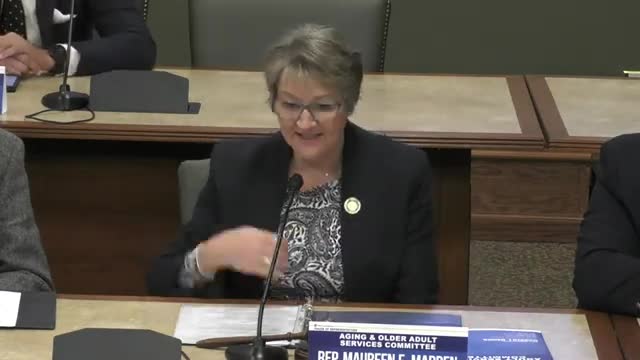House committee hears competing claims on bill to require hearing-aid coverage for adults
Get AI-powered insights, summaries, and transcripts
Subscribe
Summary
The House Aging and Older Adult Services Committee heard testimony for and against House Bill 1670, which would require health insurers to provide a minimum hearing-aid benefit for adults; audiologists argued the bill improves health and reduces downstream costs, while the Insurance Federation warned of premium increases and urged alternative approaches.
The House Aging and Older Adult Services Committee held a public hearing on House Bill 1670, which would require certain health insurance policies to provide coverage for hearing aids and associated professional services. Chairwoman Madden opened the hearing and described the intent to consider evidence from both supporters and opponents.
Co-prime sponsor Rep. Joe Hohenstein told the committee that hearing loss is a barrier to independence for many adults and said the bill aims to prevent older Pennsylvanians from losing access to hearing aids for financial reasons. "Hearing is foundational to independence, safety, and connection," Hohenstein said, and he urged bipartisan support for a policy that would, in his words, help older adults remain active and engaged.
Clinical witnesses representing audiologists and speech-language professionals framed hearing aids as medically important interventions. Dr. Nicole Bilak, president of the Pennsylvania Speech Language Hearing Association (PISHA), said the association ‘‘offers our strong support for House Bill 1670’’ and emphasized that hearing aids fitted, programmed and supported by certified professionals are "life changing public health tools." Dr. Akila Rajapra cited population-level research and peer-reviewed studies and said professionally fitted devices cost roughly $2,000 to $8,000 per pair; she pointed to evidence associating hearing-aid use with lower rates of dementia, depression and falls and offered to provide the committee with cited studies.
Dr. James Schaeffer of the Pennsylvania Academy of Audiology described the differences between prescriptive hearing aids and over-the-counter devices and emphasized that effective treatment requires bundled services — evaluation, programming, fitting and follow-up. He warned that some low-cost retail options and third-party supplier models can limit patients’ access to follow-up services or create conflicts of interest. Schaeffer characterized the bill as a way to allow individuals to choose appropriate technology and service levels, and he presented illustrative economic estimates that, he said, support the long-term cost-effectiveness of expanded access.
Megan Barber, executive director of government affairs for the Insurance Federation of Pennsylvania, testified in opposition. Representing private insurers, Barber said the federation supports improving access to care but warned that a statutory mandate requiring coverage for hearing aids would increase premiums for all policyholders and could worsen affordability. She noted high recent rate approvals in the individual and small-group markets and urged the committee to explore alternatives — including benefit designs or procurement approaches — rather than a uniform, across-the-board statutory mandate.
Committee members asked for empirical studies and state-specific analyses, discussed existing coverage pathways (including veterans’ benefits, Medicare Advantage and other programs), and raised procurement models used by large systems as possible ways to reduce unit cost. Witnesses repeatedly offered to provide additional references and to follow up with specifics on program coverage and cost modeling.
The hearing produced no formal votes. Chairwoman Madden closed the session by saying the committee would continue to solicit stakeholder input and work toward a solution; no final legislative action was taken at the hearing.
